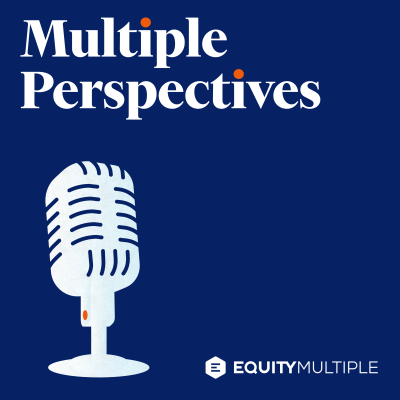
Multiple Perspectives
engelsk
Business
Prøv gratis i 0 dage
99 kr. / måned efter prøveperioden.Opsig når som helst.
- 20 lydbogstimer pr. måned
- Podcasts kun på Podimo
- Gratis podcasts
Læs mere Multiple Perspectives
Multiple Perspectives helps you unlock the potential of fractional real estate investing and alternative assets to enhance your financial strategy. With expert guests from the worlds of commercial real estate (CRE), self-directed investing, and personal finance, this podcast dives into how private-market assets can diversify your portfolio, generate passive income, and provide stability beyond traditional investments - empowering you to take control of your financial future.
Alle episoder
68 episoderUnlocking Tax-Efficient Wealth in Real Estate
In this episode of Multiple Perspectives [https://podcasts.apple.com/us/podcast/multiple-perspectives/id1511779490], host David Lofgren [https://www.linkedin.com/in/david-lofgren/] sits down with Thomas Castelli [https://www.linkedin.com/in/thomascastelli/], CPA, real estate investor, podcast host, and Partner at Hall CPA Group [https://www.hallcpagroup.com/], to unpack the powerful intersection of tax strategy and passive real estate investing. From leveraging depreciation and cost segregation studies to the smart allocation of investments across taxable and retirement accounts, Thomas shares practical insights that help investors maximise their after-tax returns. He also introduces the “Buy Box Framework” for aligning deals with personal goals and outlines the three pillars of portfolio diversification. This conversation is a must-listen for limited partners seeking to build resilient, tax-efficient real estate portfolios. What You'll Learn: * How to leverage depreciation and cost segregation to maximize tax benefits * The strategic difference between investing through IRAs vs. taxable accounts * The "Investment Buy Box" framework for evaluating deals based on growth vs. income * How to assess sponsor quality through multiple market cycles and track records * The three-pillar approach to diversification: sponsors, asset classes, and markets * Why understanding market timing and interest rates is crucial for optimal timing * The tax implications of debt vs. equity investments in commercial real estate * How to avoid common pitfalls in special allocations and unrelated business income tax * The strategic advantage of waiting for full investment cycles before deepening sponsor relationships Thomas Castelli is a CPA, Partner at Hall CPA Group, and co-host of the Tax Smart REI Podcast. With over a decade of experience as both a tax advisor and active investor, he specialises in helping limited partners and commercial real estate investors maximise after-tax returns. Combining technical expertise with hands-on investing, Thomas guides clients through cost segregation, fund structuring, and strategic allocations, empowering high-income professionals and real estate entrepreneurs to scale wealth efficiently while navigating complex tax landscapes. To learn how EquityMultiple is making commercial real estate investing more accessible, transparent, and rewarding for individual investors, head to https://equitymultiple.com/ [https://equitymultiple.com/] Episode Highlights: * 02:15 Leveraging Depreciation for Tax-Efficient Real Estate Investing Thomas explains how depreciation acts as a powerful tax shelter in commercial real estate investments, allowing investors to generate positive cash flow while showing paper losses to the IRS. For high-earning professionals, this creates an opportunity to reduce their effective tax rate from 37% plus state taxes significantly through passive real estate investments. The tax benefit comes from depreciation being a non-cash expense that exists only on paper, while the underlying real estate typically appreciates in value. Through cost segregation studies and bonus depreciation, investors can accelerate these tax benefits to offset both rental income and other passive income. * 09:45 The Investor's Buy Box Framework Rather than chasing any available deal, Thomas emphasizes developing a clear "buy box" of investment criteria based on your specific goals around growth vs income, sponsor quality, and target returns. High-net-worth investors must first determine if they're seeking appreciation potential or steady cash flow, as this fundamentally shapes which opportunities fit their strategy. The framework requires evaluating sponsor track records through multiple market cycles, not just recent performance. Institutional-quality sponsors with 20+ year histories tend to navigate market challenges more successfully than newer operators. This systematic approach helps investors filter the tremendous deal flow available and align investments with their financial objectives. * 15:20 Strategic Allocation of Real Estate Investments Thomas advises investors to be strategic about which accounts hold different types of real estate investments, as the tax treatment varies significantly. High-income professionals should consider holding equity investments in personal accounts to maximize depreciation benefits, while debt investments may be better suited for retirement accounts. Special attention must be paid to unrelated business taxable income (UBTI) when investing through IRAs, as leveraged real estate can trigger unexpected taxes. For optimal tax efficiency, Thomas recommends keeping passive real estate investments outside retirement accounts while using IRAs/401 (k)’s for interest-generating investments. This allocation strategy helps maximize after-tax returns across an investor's entire portfolio. * 31:00 The Three Pillars of Real Estate Portfolio Diversification Thomas outlines three critical dimensions for diversifying commercial real estate investments: sponsors, asset classes, and markets. For sophisticated investors, the key is starting with sponsor diversification by investing with multiple operators and waiting for full investment cycles before increasing allocation to any single sponsor. Asset class diversification requires deep understanding, and Thomas warns against investing in asset types you don't fully grasp, sharing his own costly lesson. Geographic diversification through multi-market funds helps protect against local market risks that could impact concentrated positions. This comprehensive approach to diversification helps investors build resilient portfolios aligned with their risk tolerance. Episode Resources: * Multiple Perspectives is brought to you by https://equitymultiple.com/ [https://equitymultiple.com/?utm_source=famehost&utm_medium=podcast&utm_campaign=multiple-perspectives] * Thomas Castelli on LinkedIn [https://www.linkedin.com/in/thomascastelli/] * Hall CPA Group Website [https://www.hallcpagroup.com/] * David Lofgren on LinkedIn [https://www.linkedin.com/in/david-lofgren/] Multiple Perspectives is handcrafted by our friends over at: fame.so [https://www.fame.so/?utm_medium=podcast&utm_source=bcast&utm_campaign=masters-of-community-with-david-spinks?utm_medium=podcast&utm_source=bcast&utm_campaign=fame-client]
From Paper Routes to Billions In Real Estate Deals: Lessons from Todd J. Drowlette
In this episode of Multiple Perspectives [https://podcasts.apple.com/us/podcast/multiple-perspectives/id1511779490], host David Lofgren [https://www.linkedin.com/in/david-lofgren/] sits down with Todd J. Drowlette [https://www.instagram.com/bettertalktotodd/], Host of A&E’s The Real Estate Commission, which premiered October 12, Managing Director of Titan Commercial Realty Group [https://titancommercialrealtygroup.com/], to explore the mindset and strategies behind his rise from a paper route entrepreneur to a multi-million-dollar broker. Todd reveals how early business fundamentals shaped his success, why relationship-building is the true engine of real estate growth, and how contrarian investing in suburban office space is already paying off. He also shares his Market Evolution Framework for spotting trends before they hit mainstream headlines. What You'll Learn: * How childhood experiences shaped a millionaire mindset * Why a relationship-driven business leads to sustainable success * The "Contrarian Investment Framework" for identifying opportunities * How to overcome anxiety and panic attacks while maintaining high performance * The "Market Evolution Principle" for spotting real estate trends before they occur * Why successful commercial real estate investing requires deep market understanding * The critical differences between speculating and investing in real estate * How to leverage expertise in the real estate sector without falling into traps Todd J. Drowlette is the Managing Director of Titan Commercial Realty Group and a seasoned broker, developer, and investor with over 18 years in commercial real estate. Having closed more than $2 billion across 1,700+ transactions, Todd specializes in retail real estate throughout the Northeast. A Siena College graduate and former faculty member, he’s been featured on Fox Business, ABC, and national radio. Todd will also host The Real Estate Commission, which premiered on October 12th on A&E. If you enjoy this episode, make sure to subscribe, rate, and review on Apple Podcasts, Spotify, and Google Podcasts. Instructions on how to do this are here [https://www.fame.so/follow-rate-review]. Episode Highlights: * 02:40 - Early Success Through Relationship-Building in Commercial Real Estate Todd reveals how becoming the youngest exclusive Starbucks broker in the country at age 22 stemmed from his willingness to build relationships and work tirelessly. His rapid success stemmed from his early career dealings with high-level executives, rather than climbing the traditional corporate ladder over 15 years. The key insight was that successful people will take chances on young, ambitious individuals who demonstrate hustle and dedication, even if they don't have all the answers yet. He credits his success to following the advice, "When somebody offers you a seat on a rocket ship, don't ask which seat; just get on the rocket ship." His story illustrates how commercial real estate can offer unique opportunities for ambitious professionals to advance their careers through direct access to key decision-makers. * 24:01 Building Wealth Through Early Business Fundamentals At age 11, Todd learned crucial business lessons running a paper route that shaped his future success in commercial real estate. He discovered the importance of not extending credit to unqualified customers and the value of building direct relationships with clients through consistent, reliable service. Managing this early business taught him about profit margins, customer service, and the power of reinvesting earnings. He was making $3,500 annually and achieving 18% returns in mutual funds as a pre-teen. These fundamental lessons about business operations and wealth building formed the foundation for his later success in commercial real estate. * 35:15 Contrarian Investment Strategy in Suburban Office Space Todd shares his contrarian approach to investing heavily in suburban office properties during COVID, while others were fleeing the market. He explains that successful investing requires understanding market cycles and having the courage to buy when others are panicking, citing lessons from studying historical figures like Andrew Carnegie and John D. Rockefeller. The strategy focuses specifically on suburban properties with on-site parking, anticipating that businesses will relocate from city centers but still need physical office space. This framework emphasizes buying assets at 50 cents on the dollar during market corrections rather than chasing trendy investments. * 38:29 The "Market Evolution Framework" for Spotting Real Estate Trends Todd explains his systematic approach to identifying emerging real estate trends before they become widely recognized. His framework involves closely monitoring real estate managers' changing behaviors around store openings, relocations, and space utilization as early indicators. The key is focusing not just on what industry leaders are saying but understanding why they're making specific decisions in different market contexts. This approach allows investors to position themselves ahead of major market shifts rather than reacting to them. Episode Resources: * Multiple Perspectives is brought to you by https://equitymultiple.com/ [https://equitymultiple.com/?utm_source=famehost&utm_medium=podcast&utm_campaign=multiple-perspectives] * Todd J. Drowlette on LinkedIn [https://www.linkedin.com/in/bettertalktotodd/] * TITAN Commercial Realty Group LLC Website [https://titancommercialrealtygroup.com/] * The Real Estate Commission [https://www.aetv.com/shows/the-real-estate-commission] Multiple Perspectives is handcrafted by our friends over at: fame.so [https://www.fame.so/?utm_medium=podcast&utm_source=bcast&utm_campaign=masters-of-community-with-david-spinks?utm_medium=podcast&utm_source=bcast&utm_campaign=fame-client]
Rethinking Value-Add: Smarter Multifamily Investing with Rob Beardsley
In this episode of Multiple Perspectives [https://podcasts.apple.com/us/podcast/multiple-perspectives/id1511779490], hosts David Lofgren [https://www.linkedin.com/in/david-lofgren/] sits down with Rob Beardsley [https://www.linkedin.com/in/rob-beardsley/], founder of Lone Star Capital [https://www.lscre.com/], to explore the evolving landscape of multifamily real estate investing. From building a 5,000-unit portfolio in Texas to navigating market cycles, Rob reveals why traditional value-add strategies can be overrated and how conservative underwriting, vertical integration, and location quality drive sustainable success. Whether you’re an LP or high-net-worth investor, this conversation delivers actionable insights for smarter real estate decisions. What You'll Learn: * How to avoid the common pitfall of over-romanticizing value-add strategies * Why vertical integration in property management can reduce costs by up to 65% * The framework for evaluating multifamily investments beyond simple financial metrics * How to assess property management capabilities when conducting due diligence * Why higher projected returns often signal increased risk rather t * How market cycles affect asset quality pricing and create strategic opportunities * The critical importance of focusing on location quality and tenant profile * Why conservative underwriting and realistic assumptions create healthier outcomes Rob Beardsley is the Founder and CEO of Lone Star Capital, a Texas-based multifamily investment firm with over 5,000 units acquired since 2018. He has overseen $750M in transactions, leading acquisitions, financing, and vertically integrated property management through Lone Star Communities. Author of two bestselling books, including The Definitive Guide to Underwriting Multifamily Acquisitions with 25,000+ copies sold, Rob is a sought-after speaker and host of the Lone Star Capital podcast, offering practical insights on real estate strategy, risk, and operations. If you enjoyed this episode, make sure to subscribe, rate, and review on Apple Podcasts, Spotify, and Google Podcasts. Instructions on how to do this are here [https://www.fame.so/follow-rate-review]. Episode Highlights: * 09:40 The Value-Add Trap in Real Estate Investing Rob reveals how many new investors are drawn to value-add multifamily deals due to their apparent simplicity and potential upside. He explains that while value-add strategies can work, the success depends more on purchase price and market timing than the renovation plan itself. The strategy became particularly dangerous when capital markets stopped discriminating between asset quality, leading investors to take on riskier properties. High-income professionals should understand that Class A properties often perform better in downturns since tenants have more financial stability. For optimal risk-adjusted returns, focus on well-located properties with strong fundamentals rather than chasing higher yields through deep value-add plays. Conservative underwriting and realistic assumptions are crucial for long-term success in real estate investing. * 18:38 Vertical Integration as a Competitive Advantage Rob demonstrates how bringing property management and construction in-house can dramatically reduce costs and improve operational control. He shares a real example where their in-house construction team completed a $700,000 roof repair project for just $250,000, showcasing potential savings of over 60%. Professional investors should recognize that while vertical integration requires more upfront investment in personnel, the long-term cost savings and quality control benefits can significantly enhance returns. By maintaining an ownership mindset throughout the organization and handling repairs in-house, properties can achieve better financial performance. * 34:25 Market Timing and Asset Quality in 2024 Rob provides crucial insight into the current commercial real estate market, noting that high-quality assets (B+ and better) likely bottomed in late 2023. He explains how market cycles affect asset quality pricing differently, with premium properties down roughly 20% while lower-quality assets have fallen up to 50%. For high-net-worth investors, this divergence creates potential opportunities in both segments of the market. The best-quality properties are already seeing increased competition and price recovery, while distressed assets may present opportunities for significant returns if purchased at the right time. Sophisticated investors should watch for signs of market improvement and capital markets stabilization before moving into more challenging assets. * 40:18 Understanding Risk-Return Trade-offs in Real Estate Rob emphasizes how projected returns on paper often mask the true risk profile of real estate investments. He cautions that deals promising exceptionally high returns typically carry proportionally higher risks, whether through leverage, asset quality, or location. Sophisticated investors should focus on understanding the fundamental drivers of returns rather than being seduced by aggressive projections. The most sustainable approach involves building a portfolio of solid-performing assets that can deliver consistent returns over time. Episode Resources: * Multiple Perspectives is brought to you by https://equitymultiple.com/ [https://equitymultiple.com/?utm_source=famehost&utm_medium=podcast&utm_campaign=multiple-perspectives] * Rob Beardsley on LinkedIn [https://www.linkedin.com/in/rob-beardsley/] * Lone Start Capital Website [https://www.lscre.com/] Multiple Perspectives is handcrafted by our friends over at: fame.so [https://www.fame.so/?utm_medium=podcast&utm_source=bcast&utm_campaign=masters-of-community-with-david-spinks?utm_medium=podcast&utm_source=bcast&utm_campaign=fame-client]
Why Mindset Beats Analysis in Long-Term Investing: Insights from Brian Feroldi
In this episode of Multiple Perspectives [https://podcasts.apple.com/us/podcast/multiple-perspectives/id1511779490], host David Lofgren [https://www.linkedin.com/in/david-lofgren/] sits down with investor and educator Brian Feroldi [https://www.linkedin.com/in/brianferoldi/] to unpack the psychology behind successful investing. From his early mistakes in day trading to building long-term conviction, Brian shares how mastering mindset matters more than market analysis. Listeners will learn why financial foundations create psychological safety, how to seize opportunities during downturns, and the role of continuous learning and AI tools in building resilient investment strategies. What You'll Learn: * How to evolve from short-term trading to building sustainable wealth through long-term investment strategies * The Psychology First Principle: Why natural human emotions often lead to poor investment decisions * How to develop conviction in your investment thesis by thoroughly understanding business fundamentals * Why market downturns present opportunities and how to train yourself to act against emotional impulses * The "Personal Finance Foundation" framework for building psychological safety in your investment approach * How to strategically incorporate AI tools into investment research without compromising analysis quality * The "Network Effects Test" for evaluating competitive advantages in modern businesses * Why index funds remain the optimal choice for 99% of investors, and how to know if you're in the 1% Brian Feroldi is the founder of Long Term Mindset, a renowned investment strategist and financial educator with over 20 years of experience. Known for blending fundamental analysis with investor psychology, he helps individuals build conviction, resilience, and confidence in their investing. From early lessons as a novice trader to identifying opportunities in companies like Google, Netflix, and Chipotle, Brian has built a market-beating portfolio and now teaches others how to analyze businesses and invest successfully for the long term. If you enjoyed this episode, make sure to subscribe, rate, and review on Apple Podcasts, Spotify, and Google Podcasts. Instructions on how to do this are here [https://www.fame.so/follow-rate-review]. Episode Highlights: * [02:19] The Psychology of Early Investing Mistakes Brian shares how his initial approach to investing focused on day trading and quick gains, leading to consistent losses that ultimately became valuable learning experiences. For high-earning professionals, understanding that even business education often fails to teach practical investing wisdom is crucial to avoiding common pitfalls. Rather than giving up after early failures, Brian recognized the stock market as a long-term wealth-building machine and committed to learning proper investment principles. He discovered that studying investing books and maintaining persistence through setbacks was essential for developing sound investment knowledge. This mindset shift from short-term trading to long-term investing became the foundation for his future success as an investor. * [13:40] Capitalizing on Market Fear During the 2008-9 financial crisis, Brian identified Google as a strong investment opportunity when its stock had fallen 60% from its peak, demonstrating how market panic creates opportunities. High-earning professionals can learn that the most profitable investments often come when market sentiment is at its most negative. He explains how he similarly invested in Netflix during its 80% decline in 2013 and Chipotle during its 75% drop in 2015 due to the E. coli crisis. The key insight is that having deep knowledge of a company's fundamentals provides the conviction to invest when others are fearful. * [31:20] The Critical Role of Continuous Learning Brian emphasizes that modern investors have unprecedented access to educational resources through podcasts, YouTube, blogs, and other digital platforms. For wealth managers and finance professionals, the challenge isn't finding information but rather identifying quality sources and avoiding misleading content. He recommends starting with the company's annual reports and using AI tools to help analyze and understand complex financial documents. The focus should be on building genuine conviction through thorough research rather than making superficial investment decisions. This approach helps develop the deep understanding necessary to maintain positions through market volatility. * [34:49] Building a Resilient Investment Portfolio Brian reveals that 70% of his net worth is in individual stocks, with the remainder in index funds for retirement accounts and cash reserves. For high-net-worth individuals, he stresses the importance of having a strong personal finance foundation, including zero debt and six months of emergency funds, before pursuing active investing. This conservative approach to personal finances provides the psychological safety needed to invest aggressively in stocks. The strategy involves holding about 30 companies long-term and allowing winners to become larger portfolio positions naturally through appreciation. Episode Resources: * Multiple Perspectives is brought to you by https://equitymultiple.com/ [https://equitymultiple.com/?utm_source=famehost&utm_medium=podcast&utm_campaign=multiple-perspectives] * Brian Feroldi on LinkedIn [https://www.linkedin.com/in/brianferoldi/] * Long Term Mindset Website [https://brianferoldi.kit.com/accountingebook] Multiple Perspectives is handcrafted by our friends over at: fame.so [https://www.fame.so/?utm_medium=podcast&utm_source=bcast&utm_campaign=masters-of-community-with-david-spinks?utm_medium=podcast&utm_source=bcast&utm_campaign=fame-client]
Why Working Less Can Build More Wealth with Andy Hill, Founder of Marriage, Kids and Money
In this episode of Multiple Perspectives [https://podcasts.apple.com/us/podcast/multiple-perspectives/id1511779490], host David Lofgren [https://www.linkedin.com/in/david-lofgren/] is joined by Andy Hill [https://www.linkedin.com/in/andyhillmkm/], Founder of Marriage, Kids and Money, to discuss how families can achieve financial independence while prioritizing time together. They explore the "Coast FIRE" strategy, why the traditional 40-year corporate grind might not be the only path to wealth, and how to use money as a tool to buy back precious family time rather than just accumulating assets. What You'll Learn: * How to reframe financial success beyond traditional retirement planning to create freedom earlier in life * The "Coast FIRE" strategy for building wealth while working less and enjoying life today * Why diversifying your life portfolio is as crucial as diversifying your financial portfolio * How to transition from corporate work to part-time entrepreneurship without sacrificing financial security * The framework for calculating exactly how much wealth you need to maintain your desired lifestyle * Why generational wealth transfer should focus on knowledge and values rather than just money * How to structure your finances to support a 20-25 hour work week while maintaining financial stability * The importance of challenging cultural narratives about success, wealth-building, and work-life balance Andy Hill is the Founder of Marriage, Kids and Money, a financial education company focused on helping families achieve time freedom. After experiencing corporate burnout while raising young children, Andy created content to document his family's journey from negative $50,000 net worth to over $1 million while building a lifestyle that prioritizes family time. Through his podcast, YouTube channel, and educational content, Andy helps families use intentional financial strategies to buy back time and create lives aligned with their values rather than just their bank accounts. If you enjoyed this episode, make sure to subscribe, rate and review on Apple Podcasts, Spotify and Google Podcasts, instructions on how to do this are here [https://www.fame.so/follow-rate-review]. Episode Highlights: * [08:33] Challenging the 40-Year Corporate Career Myth Andy Hill reveals why he believes the traditional American ideal of working hard for 40 years until retirement is fundamentally flawed. High-earning professionals often fall into the trap of delayed gratification, betting their happiness on the final 13 years of life after retirement at 65. This approach ignores that physical capabilities and health may be diminished by then, and places too much emphasis on a future that isn't guaranteed. Andy advocates for paying attention to money management early to buy back time in your 30s and 40s when you can fully enjoy it with family and maintain better health. * [18:26] The Solopreneur Philosophy for Life Design Andy explains his intentional approach to building a "solopreneur" business that serves his life rather than consuming it. After transitioning from corporate America, he deliberately keeps his business small enough to generate the income needed for his family's comfort while preserving time for what matters most. His "glass jar" metaphor illustrates how he filled his life with the important rocks first—family, health, friendships, and time with aging parents—leaving only 20-25 hours per week for work. This approach demonstrates how redefining success can create a more fulfilling and sustainable lifestyle. * [23:12] Generational Wealth Through Knowledge, Not Just Money Andy shares his philosophy that generational wealth is better transmitted through teaching and modeling than simply leaving money to children. He references studies showing that inherited wealth typically fades by 70% after three generations because recipients lack the knowledge and motivation to preserve what they didn't earn. For his own children, Andy focuses on demonstrating a diversified approach to life success that includes strong relationships, health, and financial literacy. He emphasizes that putting all energy into one corporate job creates vulnerability, as companies can eliminate positions regardless of employee dedication and sacrifice. Episode Resources: * Multiple Perspectives is brought to you by https://equitymultiple.com/ [https://equitymultiple.com/?utm_source=famehost&utm_medium=podcast&utm_campaign=multiple-perspectives] * Andy Hill on LinkedIn [https://www.linkedin.com/in/andyhillmkm/] * Marriage Kids and Money Website [https://marriagekidsandmoney.com/] Multiple Perspectives is handcrafted by our friends over at: fame.so [https://www.fame.so/?utm_medium=podcast&utm_source=bcast&utm_campaign=masters-of-community-with-david-spinks?utm_medium=podcast&utm_source=bcast&utm_campaign=fame-client]
Vælg dit abonnement
Premium
20 timers lydbøger
Podcasts kun på Podimo
Gratis podcasts
Opsig når som helst
Prøv gratis i 0 dage
Derefter 99 kr. / month
Premium Plus
100 timers lydbøger
Podcasts kun på Podimo
Gratis podcasts
Opsig når som helst
Prøv gratis i 0 dage
Derefter 129 kr. / month
Prøv gratis i 0 dage. 99 kr. / måned efter prøveperioden. Opsig når som helst.

































